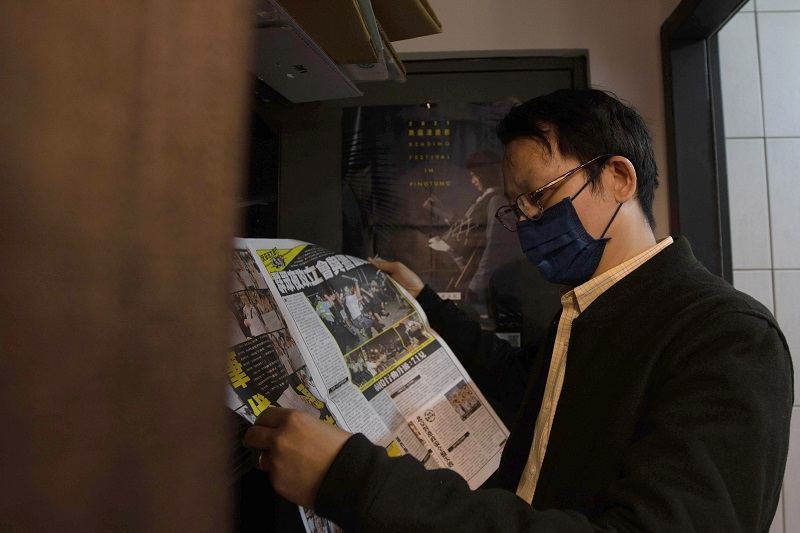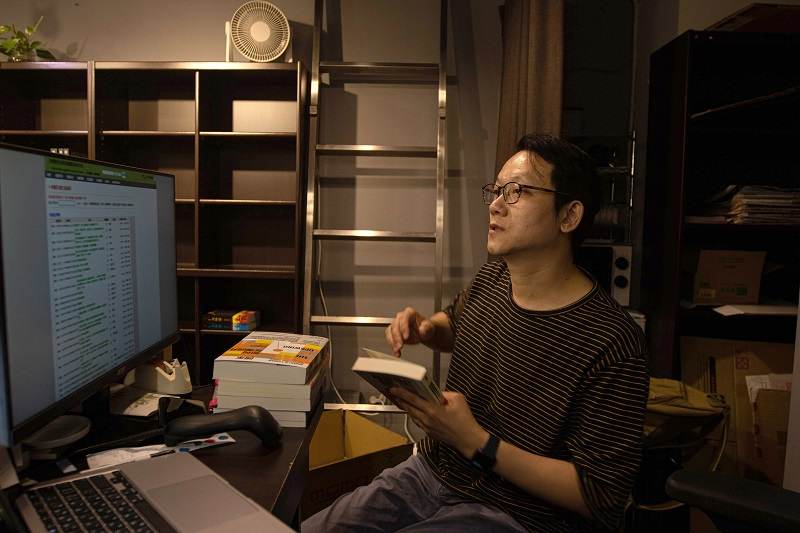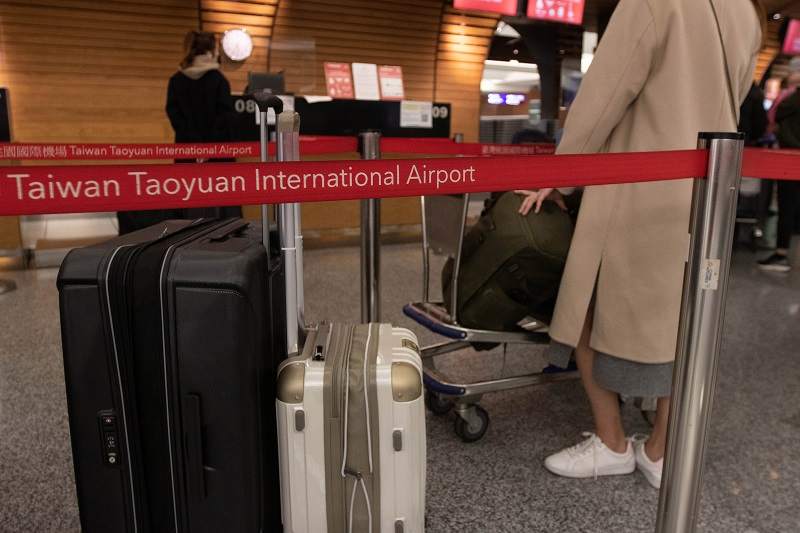
Carver Law looks at newspaper clippings from the 2019 pro-democracy protests in Hong Kong at his bookstore in Taipei, Taiwan, in December 2021.
13:17 JST, June 1, 2022
TAIPEI, Taiwan – The day after his bookshop officially closed, Carver Law sat in the small store methodically packing books into boxes. The half-empty shelves still held a collection of essays by Hong Kong pop singer and activist Denise Ho, an account of the 1989 Tiananmen Square massacre, and books on the nature of dictatorships and Chinese leader Xi Jinping.
The 51-year-old paused to say goodbye to the last few customers who had come to wish him well. Two years before, Law had fled the expanding repression in Hong Kong for the promised safety of Taiwan and opened a bookstore in the heart of Taipei. It was meant to be a space for Hong Kongers and Taiwanese to exchange ideas and learn from one another. Now, he was leaving again.
“It’s a shame. I wanted to put down roots and was starting to feel like I was building something here,” he said. “Now it’s gone.”
Law had fulfilled the requirements for permanent residency, but his application had been pending for months. Uncertain if it would ever come through, he and his wife decided to move to Britain, where their applications for British national overseas status were approved after just five days.

Carver Law packs up inventory at his bookshop in Taipei, Taiwan, in December 2021 as he prepares to move to Britain.
Law is part of a growing group of Hong Kongers who had once hoped to resettle in Taiwan, where officials tout their support for those fleeing Beijing’s tightening grip over the territory. Instead, the exiles have discovered the limits of their welcome here as authorities, worried about overly provoking Beijing or exposing Taiwan to mainland infiltration, have stopped short of giving Hong Kongers permanent residency.
After escaping Beijing’s oppression in their home city, Hong Kongers paradoxically find themselves under suspicion in their new home for possible links to China. They have become victims of the increasingly urgent debate on this independently governed island over the threat from China, which sees it as a province.
In May, a plan to allow those from Hong Kong and Macao, another Chinese territory, to obtain permanent residency after five years in Taiwan on a work permit was delayed when some lawmakers argued that it would open the door to influence campaigns and agents of the Chinese Communist Party trying to undermine Taiwan’s democratic system.
“The argument is that Hong Kong is now China-controlled, so if you allow these people to come in, they will be Chinese people,” said Huang Cheng-Yi, a research professor at Academia Sinica. “If Hong Kong people equal Chinese citizens, then why do we want to let them come in?”
“Fear of China has increased,” Huang said, citing Xi’s increasingly ideological turn as he prepares to take on a precedent-breaking third-term as China’s leader, as well as Russia’s invasion of Ukraine, which some worry could be a model for a Chinese takeover of Taiwan. “So the fear in the mind of Taiwanese people became very strong,” he said.
As Beijing tightened its control over Hong Kong in the aftermath of mass protests in 2019, Taiwan emerged as a refuge for fleeing activists and supporters of the pro-democracy movement. Taiwanese President Tsai Ing-wen pledged to “stand with Hong Kong” and assist those persecuted under a sweeping national security law imposed in 2020. The protests formed a key part of her reelection campaign that year.
More than 27,000 Hong Kongers – including entrepreneurs, professionals and students, as well as activists – came to Taiwan on temporary visas between 2019 and 2021, according to government figures. A special office was set up to coordinate a humanitarian response, while authorities personally oversaw sensitive cases. A group of Hong Kong escapees who arrived by boat lived in government housing, where they were provided clothing, television, cigarettes and English tutors.
But Hong Kongers say the welcome does not appear to be indefinite. Many who have applied for permanent residency have seen their applications denied on the basis of their connections to mainland China, or just left hanging.
Eight Hong Kongers living in Taiwan, including Law, described to The Washington Post why they had recently left the island or were planning to move to countries such as Britain and Australia where starting a new life would be easier. Others said they had no choice but to return to Hong Kong.
Ceci, a recent college graduate, fled Hong Kong after seeing her friends arrested one after another under the new security law. In Taiwan, she had to renew her “special case” visa, given to individuals involved in the 2019 demonstrations, every month. Ceci – who, like others, asked to be identified by only her first name for fear of repercussions – constantly worried that her status would be affected by cross-strait tensions, or by Taiwan’s next elections if a party less committed to helping Hong Kongers came to power.
Late last year, she quietly left her new home of Taipei for London. Ceci and her friends took selfies at the nearly deserted international airport. Having already said goodbye to so many friends over the last few years, they were not emotional.
“This place does not give me a sense of security. I feel like at any time I may have to leave everything behind again,” she said.

Ceci, a former Hong Kong protester, at the airport in Taoyuan, Taiwan, in December 2021 as she moves to London. Ceci asked to be identified by only her first name for fear of repercussions.
Sympathy for Hong Kong is high in Taiwan, where resistance to the idea of unification with China under a similar “one country, two systems” model has grown as residents observe the increasingly authoritarian bent of China’s top leaders. In March, a documentary about the 2019 demonstrations, “Revolution of Our Times,” broke box office records in Taiwan, with politicians and groups hosting private screenings.
But that sympathy is tempered by anxieties about large-scale immigration to Taiwan, home to 24 million people competing for limited jobs and housing, as well as pockets of long-standing prejudice against migrants from mainland China.
Observers say the government has made a political calculation that the silent majority of Taiwanese do not want to see large inflows from Hong Kong. For some, it is an uncomfortable reminder of the arrival of about 2 million refugees fleeing China after the Nationalist government’s defeat by the Chinese Communist Party in 1949, which irrevocably changed the makeup of Taiwanese society.
“I feel like the main aim of the policy now is to not let Hong Kongers in. Pretending that they are helping is enough,” said one former official who worked on assistance efforts for Hong Kongers, speaking on the condition of anonymity because of the sensitivity of the matter.
As Hong Kong comes more firmly under China’s hold, those from the city are also seen with more suspicion. A review of 13 cases of Hong Kongers whose applications for permanent or short-term residency were denied found that the applicants were all rejected for connections to China.
One of the rejected applicants was Cherry, 60, who has been selling health products in northern Taiwan for more than a year. In a decision letter from the Interior Ministry, her application was denied because she was “suspected of endangering national interests” on the basis of her work at a public university in Hong Kong.
Another rejected applicant, Sandy, 40, who arrived in Taiwan in 2019 and set up an accounting firm, said she was shocked when she was turned down on the basis of her birthplace: China.
“I was so disappointed,” she said. “I spent every day in fear, asking myself if I had done anything wrong.” In July 2021, she returned to Hong Kong.
The stricter approach began in August 2020, when the Interior Ministry started requiring extra review of residency applications from former residents of Hong Kong and Macao who had served in Chinese public institutions, were born in mainland China, or had worked for organizations with investment from Chinese state entities.
According to Taiwan’s immigration authority, more than 3,200 have received permanent residency in 2020 and 2021. It declined to say how many applications had been rejected but said the proportion was “very low.”
Phyllis Yang, a manager at an immigration consulting company that has been providing services for Hong Kongers immigrating to Taiwan said that in the past, review of residency applications took two weeks to a month. Now it can take six months to a year, and those with connections to China or the Hong Kong government see a much higher rate of rejection.
Law and his wife had hoped to stay in Taiwan until their 11-year-old daughter finished high school. He regrets not only having to leave but also what Taiwan will lose as people like him move on – his dream of creating a space where Taiwanese and Hong Kongers could interact has been dashed.
“Hong Kong people have a lot of talent to contribute. If they are turned away, they will go to another place,” he said. “I don’t feel all that sad about leaving,” he added. “Even though our store won’t be here, our spirit remains.”
Top Articles in News Services
-

Survey Shows False Election Info Perceived as True
-

Prudential Life Expected to Face Inspection over Fraud
-

Hong Kong Ex-Publisher Jimmy Lai’s Sentence Raises International Outcry as China Defends It
-

Japan’s Nikkei Stock Average Touches 58,000 as Yen, Jgbs Rally on Election Fallout (UPDATE 1)
-

Trump Names Former Federal Reserve Governor Warsh as the Next Fed Chair, Replacing Powell
JN ACCESS RANKING
-

Japan PM Takaichi’s Cabinet Resigns en Masse
-

Japan Institute to Use Domestic Commercial Optical Lattice Clock to Set Japan Standard Time
-

Israeli Ambassador to Japan Speaks about Japan’s Role in the Reconstruction of Gaza
-

Man Infected with Measles Reportedly Dined at Restaurant in Tokyo Station
-

Videos Plagiarized, Reposted with False Subtitles Claiming ‘Ryukyu Belongs to China’; Anti-China False Information Also Posted in Japan

























